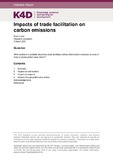| dc.contributor.author | Lucas, Brian | |
| dc.coverage.spatial | Brazil | en |
| dc.coverage.spatial | India | en |
| dc.coverage.spatial | Nigeria | en |
| dc.coverage.spatial | the Philippines | en |
| dc.coverage.spatial | South Africa | en |
| dc.date.accessioned | 2021-03-30T14:22:16Z | |
| dc.date.available | 2021-03-30T14:22:16Z | |
| dc.date.issued | 2021-03-05 | |
| dc.identifier.citation | Lucas, B. (2021). Impacts of trade facilitation on carbon emissions. K4D Helpdesk Report 976. Brighton, UK: Institute of Development Studies. DOI: 10.19088/K4D.2021.039 | en |
| dc.identifier.uri | https://opendocs.ids.ac.uk/opendocs/handle/20.500.12413/16525 | |
| dc.description.abstract | There is very little evidence that trade facilitation measures have a significant impact on carbon emissions, except in the case of trucks at land border crossings, where there is good evidence that trade facilitation can lead to significant reductions in emissions. There is good evidence that trade facilitation measures at land border crossings can reduce traffic congestion and waiting times for trucks, but only limited evidence of the impact of these improvements on carbon emissions. Computer models of inspection stations at the USA-Mexico border suggest that improving the efficiency of land border crossings through the driver, vehicle, and cargo pre-registration, automating inspection and administrative processes, and carrying out joint customs inspections could potentially reduce CO2 emissions from trucks by up to 86% in some cases. There appears to be no evidence available about whether trade facilitation efforts at seaports have an impact on carbon emissions; this issue appears to not have been studied by any ports, international agencies, or researchers. Some seaports have produced estimates of their carbon footprints, but none appear to have considered customs inspection or other activities related to trade facilitation as a distinct activity. Very few studies address the impacts of trade facilitation on carbon emissions across global value chains. Two studies that have done so suggest that trade facilitation measures could lead to small increases in CO2 emissions, ranging from less than 0.1% to 2.23%. Studies examining the more general relationship between increasing trade and carbon emissions, without specifically focusing on trade facilitation measures, have found mixed results including positive, negative, and inverse U-shaped relationships in different countries and groups of countries; several of these studies suggest that a country’s level of economic development and quality of political institutions influence the relationship between trade openness and carbon emissions. | en |
| dc.description.sponsorship | FCDO (Foreign, Commonwealth and Development Office) | en |
| dc.language.iso | en | en |
| dc.publisher | Institute of Development Studies | en |
| dc.relation.ispartofseries | K4D Helpdesk Report;976 | |
| dc.rights.uri | https://www.nationalarchives.gov.uk/doc/open-government-licence/version/3/ | en |
| dc.subject | Environment | en |
| dc.subject | Trade | en |
| dc.title | Impacts of Trade Facilitation on Carbon Emissions | en |
| dc.type | Helpdesk | en |
| dc.rights.holder | © Crown copyright 2021 | en |
| dc.identifier.doi | 10.19088/K4D.2021.039 | |
| dcterms.dateAccepted | 2021-03-05 | |
| rioxxterms.funder | Default funder | en |
| rioxxterms.identifier.project | Default project | en |
| rioxxterms.version | VoR | en |
| rioxxterms.versionofrecord | 10.19088/K4D.2021.039 | en |
| rioxxterms.funder.project | 9ce4e4dc-26e9-4d78-96e9-15e4dcac0642 | en |

